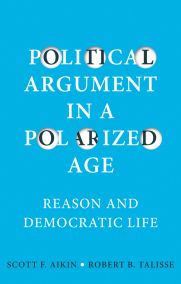by Scott F. Aikin and Robert B. Talisse

Democracy is a precious social good. Not only is it necessary for legitimate government, in its absence other crucial social goods – liberty, autonomy, individuality, community, and the like – tend to spoil. It is often inferred from this that a perfectly realized democracy would be utopia, a fully just society of self-governing equals working together for their common good. The flip side of this idea is familiar: the political flaws of a society are ultimately due to its falling short of democracy. The thought runs that as democracy is necessary for securing the other most important social goods, any shortfall in the latter must be due to a deviation from the former. This is what led two of the most influential theorists of democracy of the past century, Jane Addams and John Dewey, to hold that the cure for democracy’s ill is always more and better democracy.
The Addams/Dewey view is committed to the further claim that democracy is an ideal that can be approximated, but never achieved. This addition reminds us that the utopia of a fully realized democracy is forever beyond our reach, an ongoing project of striving to more perfectly democratize our individual and collective lives.
This view is certainly attractive. Trouble lies, however, in making the democratic ideal concrete enough to serve as a guide to real-world politics without thereby deflating it of its ennobling character. Typically, as the ideal is made more explicit, one finds that it presumes capacities that go far beyond the capabilities of ordinary citizens. It turns out that democracy isn’t only out of our reach, it’s also not for us. Read more »
